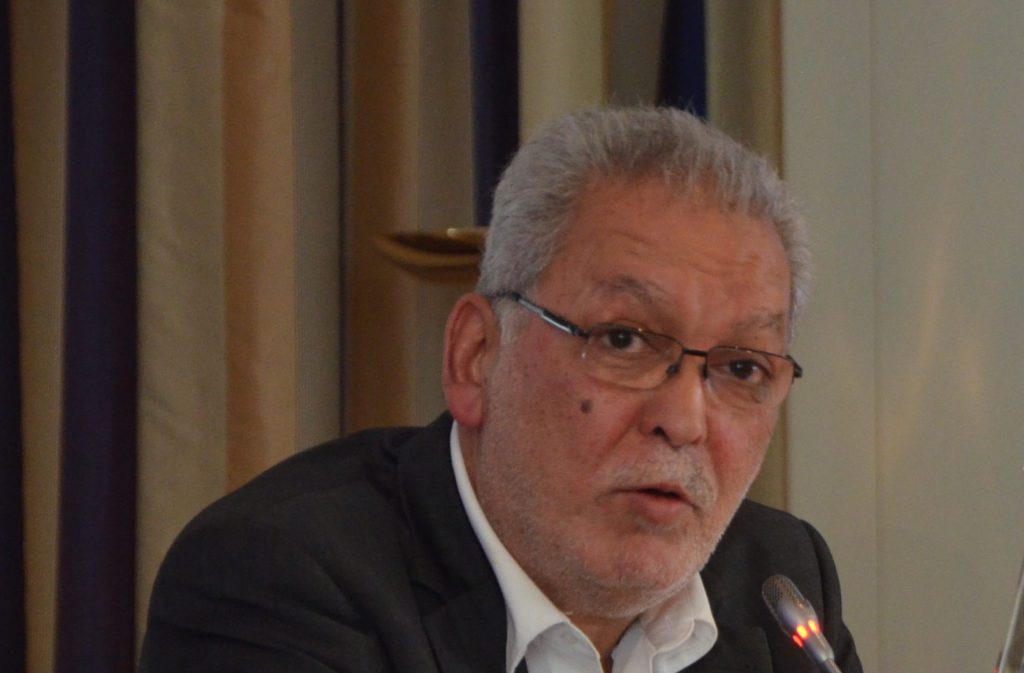In 2022, EuroMed Rights celebrates its 25th anniversary! To mark this milestone, we asked members to tell us what EuroMed Rights meant to them and their organisation.
After the 2011 Revolution, Kamel Jendoubi returned to Tunisia after 16 years of exile in France. He was then elected Chair of the Independent High Authority for Elections in charge of organising and supervising elections and referendums in Tunisia. In 2015 and 2016, he served as Minister in charge of Relations with Constitutional Institutions and Civil Society, and Human Rights. Between 2017 and 2021, Kamel Jendoubi was leading the UN Group of Eminent Experts to investigate human rights violations in Yemen.
“I’m honoured to celebrate the 25th anniversary of EuroMed Rights. What a journey it has been since the Euro-Mediterranean Human Rights Network was founded in 1997! After the establishment of the Euro-Mediterranean Partnership, the initiators of the network felt that creating some sort of platform that would bring together civil societies from the South and North of the Mediterranean to monitor the Barcelona Process would enhance human rights work significantly.
How did the idea of the network emerge?
The idea of an NGO network emerged pretty quickly, and the first assembly took place in Copenhagen in 1997, with the objective to set up a North/South interface as well as a forum with regional civil society actors to work on human rights and on cross-cutting and specific issues in the region. Of course, back in the days, some tensions erupted since the situations in the ‘liberal North’ and in the ‘repressive South’ were so obviously different. The question of Palestine was also central to the regional equation: we were still excited by the Oslo Agreements and moving toward the construction of a Palestinian State, and it was clear then that the EuroMed Rights network would have to make it a work priority.
In terms of methodology, we defined three main lines of work: thematic priorities (women’s rights, migration, justice, freedom of association and peaceful assembly/civil society, and a working group on Israel/Palestine), country priorities (“closed countries” where civil society was completely stifled, “semi-closed countries” where some work could be done under dire conditions, and the “open countries”, i.e Jordan and Morocco, where EuroMed Rights opened country programmes, respectively on women and migration), and regional priorities with the aim to follow the civil forums in the framework of the Euro-Med Partnership, to encourage partnerships with international NGOs and unions, and to develop advocacy activities toward the EU with the opening of an office in Brussels.
What vision did you promote as President?
I was elected President of the Executive Committee in 2004, almost ten years into the Barcelona Process. The 9/11 attacks of 2001 had shifted the global agenda towards the fight against terrorism, with terrible impacts on fundamental freedoms and on human rights defenders, especially in the Arab world. The need for greater protection of human rights defenders became a core priority of my mandate. How could we better support defenders who were already operating in hostile environments, under extremely difficult conditions? How could we help them fundraise even though they had no legal status? We had the idea of establishing the EuroMed Foundation for the Protection of human rights defenders in Copenhagen, which still exists today and operates as an independent entity.
When the Revolution started in Tunisia at the end of 2010, I was honorary Chair of EuroMed Rights but still very much involved when I returned to my country after 16 years in exile.
What situation did you find in Tunisia when you returned?
The main question then was again “How could we best support and accompany civil society actors” after the overthrow of the Ben Ali regime? We conducted experimental work somehow, with the establishment of an office that was an interface between the Tunisian civil society organisations (CSOs), EuroMed Rights and the European institutions. We had no specific program at the beginning, but we were pushing for an inclusive associative dynamic that would include cross-cutting themes and local needs of members and non-members.
In 2015, as I was Minister in charge of the relations with civil society, the concept of a tripartite dialogue between EuroMed Rights and CSOs, Tunisia and the EU was further developed, and it was great to see how EuroMed Rights and its network of local organisations had become key partners and stakeholders in the relations between Tunisia and the EU.
The situation in the region has not improved though…
The European dimension has changed tremendously over the years: the EU went from 15 to 27 member-states, the fight against terrorism, the issue of migration and the non-resolution of the Israel/Palestinian conflict have locked up the partnership. Then the Union for the Mediterranean has buried it by focusing mostly on trade, security and migration…The beautiful and generous idea of Barcelona has disappeared. The European Neighbourhood Policy has greatly weakened the regional dimension, the borders have closed, and the Mediterranean has become a graveyard.
Our action should always be evaluated in light of the institutional policies, which are governed by states’ concerns, and in my view, EuroMed Rights’ main priorities of work, such as freedom of association and assembly, women’s rights and migration remain important and should be pursued, especially since all this work has brought out new themes such as equality between women and men, individual freedoms etc. and has produced a substantial literature to build on.
When it comes to solidarity and support, needless to say that members and partners in Syria, Egypt or Algeria need platforms like the EuroMed Rights’ network more than ever!”
Kamel Jendoubi (Tunisia), Former President of EuroMed Rights and honorary president

